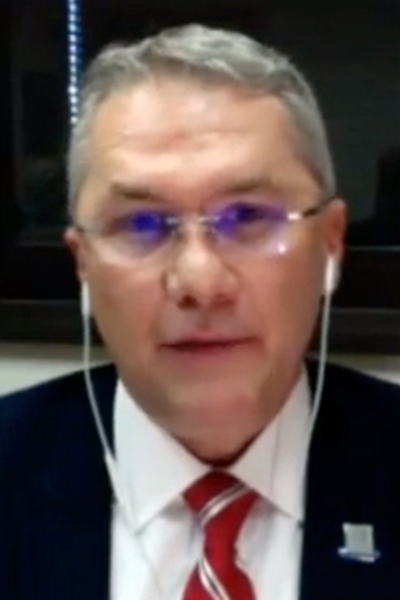
This year’s presenter of the Murray Kornfeld Memorial Founders Lecture explained how pneumonia can be used as a good model of care, research, and service.
Marcos I. Restrepo, MD, MSc, PhD, FCCP, presented “Our Pneumonia Journey: The Lungs and Beyond” during the CHEST Annual Meeting. The session is available through viewing on the CHEST virtual meeting website through February 1, 2021.
Dr. Restrepo, professor of medicine, division of pulmonary/critical care at the University of Texas Health San Antonio, director of the medical intensive care unit at South Texas Veterans Health Care System, and associate program director of the Fellowship Program of Pulmonary/Critical Care, traced how pneumonia has shaped his career. He shared many lessons from his career that can help others in the areas of research, patient care, and career development.
Starting with a look back at his career and how he became interested in pneumonia, he advised the audience to know their goals, find a niche, and live by their values. That requires finding mentors who provide feedback and advice, and Dr. Restrepo saluted the many mentors that have shaped his life and career.
“It’s important for you to follow advice in order for you to be able to execute what other people with more expertise are able to do. Learning from their own experiences will allow you to proceed in your career,” he said.
Those were the first of several specific tips Dr. Restrepo shared:
- Take initiative, be proactive, and share with others.
- Be self-aware, pay attention to time, and manage your emotions.
- Prepare yourself, everything counts, and keep learning.
- Remain disciplined, persevere to the end, and fight with courage.
- Surround yourself with smart people, remain humble, and treat them with respect.
- Adapt to adversity, be resilient, and find opportunities.
- Engage others, commit to the mission, and care for those in need.
But none of those tips matter, Dr. Restrepo said, unless you do the final tip.
“Enjoy the journey, live with gratitude and with love,” he said. “This is what I try to do every single day when I wake up. I thank God. I thank my family. I thank my parents. But I also thank my family at work and many others who have been there throughout this life, pushing us, helping us, motivating us to keep fighting this important infection that we call pneumonia. We do it as a family, and we’ve been able to support each other in these important times.”
Pneumonia became a passionate topic for Dr. Restrepo early in his career when he first saw some younger patients become extremely sick and he couldn’t understand why that happened.
Lower respiratory infections caused 2.3 million deaths in 2016, Dr. Restrepo noted, and a 2017 study found that one in three patients hospitalized with community-acquired pneumonia die within a year. And those findings come from long before COVID-19 entered the picture.
Dr. Restrepo summarized the work by he and his colleagues on the Global Initiative for MRSA Pneumonia (GLIMP) and how this point prevalence study of adult patients hospitalized with community-acquired pneumonia (CAP) has changed the status quo of pneumonia research and care.
So far, GLIMP has led to 10 publications, with three more under review, Dr. Restrepo said. It’s also led to reductions in the inappropriate use of antibiotics, a trainee education partnership between UT Health San Antonio and the University of Milan in Italy that uses the GLIMP database to train how to write manuscripts and answer scientific questions, and lead to updates in the latest CA guidelines published by the American Thoracic Society and Infectious Diseases Society of America regarding a more pathogen-specific approach and trying to determine specific risk factors driving MRSA and pseudomonas.
“But we cannot stop here,” Dr. Restrepo said. “We need to continue with advocacy, we need to try to continue getting funding for this disease. We need to continue to do research in answering important questions that continue to affect our patients. We need to keep learning and educating our providers and front-line providers in order to deliver the best care and continue to commit to compassionate care that will hopefully help us prevent this disease and treat patients who suffer from pneumonia.”



